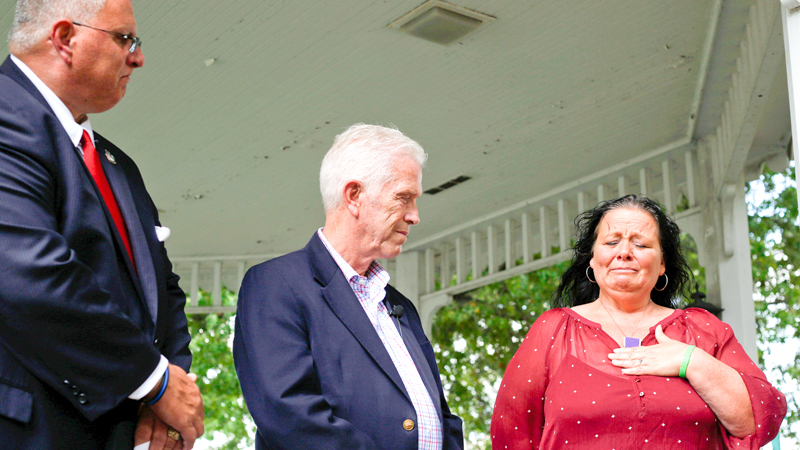Canfield mom receives Purple Heart for late son

By JUSTIN DENNIS
jdennis@vindy.com
CANFIELD
David Devellin of Canfield was just 31 when he took his own life in June, unable to exorcise the demons that followed him home when his Army tour of Iraq ended in 2010.
On Friday, Devellin’s mother, Nanette Dillon, of Canfield accepted a Purple Heart medal on his behalf from U.S. Rep. Bill Johnson of Marietta, R-6th, during a small, somber ceremony at the Canfield Green gazebo.
“War is an inhumane endeavor,” Johnson said. “Those experiences leave deep emotional and mental scars on a person.
“Thank God, Nanette, we have young people like David that love this country enough to put on that uniform and to go into harm’s way – to fight for a people and with a people he didn’t know, but for a set of values he knew well.”
The medal was for the physical injuries Devellin suffered when his special forces convoy was struck by explosive munitions. But more of the man’s lasting injuries were emotional, Dillon said, and he suffered them in silence.
The David Devellin that came home was different, she said. He was irritable and edgy, and he drank more heavily.
“He just couldn’t handle life and what he had seen and the things he had been through in the Army,” Dillon told reporters. “He refused to talk about anything. He said none of us understand what he’s been through, what he’s seen.”
Dillon said her son was unable to connect with a therapist through a U.S. Department of Veterans Affairs facility – at least not one he felt he could talk to; someone who’d also seen active combat. She said she wonders whether her son would still be alive if he was able to open up to someone.
About 240 Ohio veterans
committed suicide in 2014, according to the U.S. Department of Veterans Affairs. Though officials have said veteran suicide statistics are now on the decline, an estimated 20 veterans kill themselves each day nationwide.
“One is too many,” said Jan Brown of Youngstown, first national vice commander of AMVETS, echoing Dillon’s concerns about the lack of veteran counselors nationwide. She said the internal war Devellin fought is all too common.
“Part of it is, quite frankly, people don’t reach out. They think they can handle it,” Brown said. “I think that they don’t want to reach out because they’re afraid of how it’s going to affect their career.”
In March, AMVETS unveiled the HEAL Team and hotline, staffed by health professionals who help veterans navigate to VA services, particularly those with mental-health issues, who the team tries to reach within 72 hours.
“They don’t stop working with the person until they fix the problem,” Brown said.
The hotline is available from 8 a.m. to 8 p.m. at 833-VETHEAL. Veterans also can email the team anytime at VetHEAL@AMVETS.org.
One such service is the VA’s peer-to-peer support groups, which pair troubled veterans of similar age or from the same deployment, Brown said.
“You’re in a counseling group with not just a psychiatrist. You’re with people who have been there and done that, have been down that road – the same road you have,” she said. “They can identify with these people and see they’re not the only one going through it.”
Closing the ceremony, Johnson pinned the award to Dillon’s necklace and yielded the gazebo stage for her to speak.
Dillon thumbed the violet pendant and frowned for the first time during the ceremony, as tears came. She pointed it skyward.
“To my son: Sorry you couldn’t be here – but this is for you, babe,” she said.
 43
43
